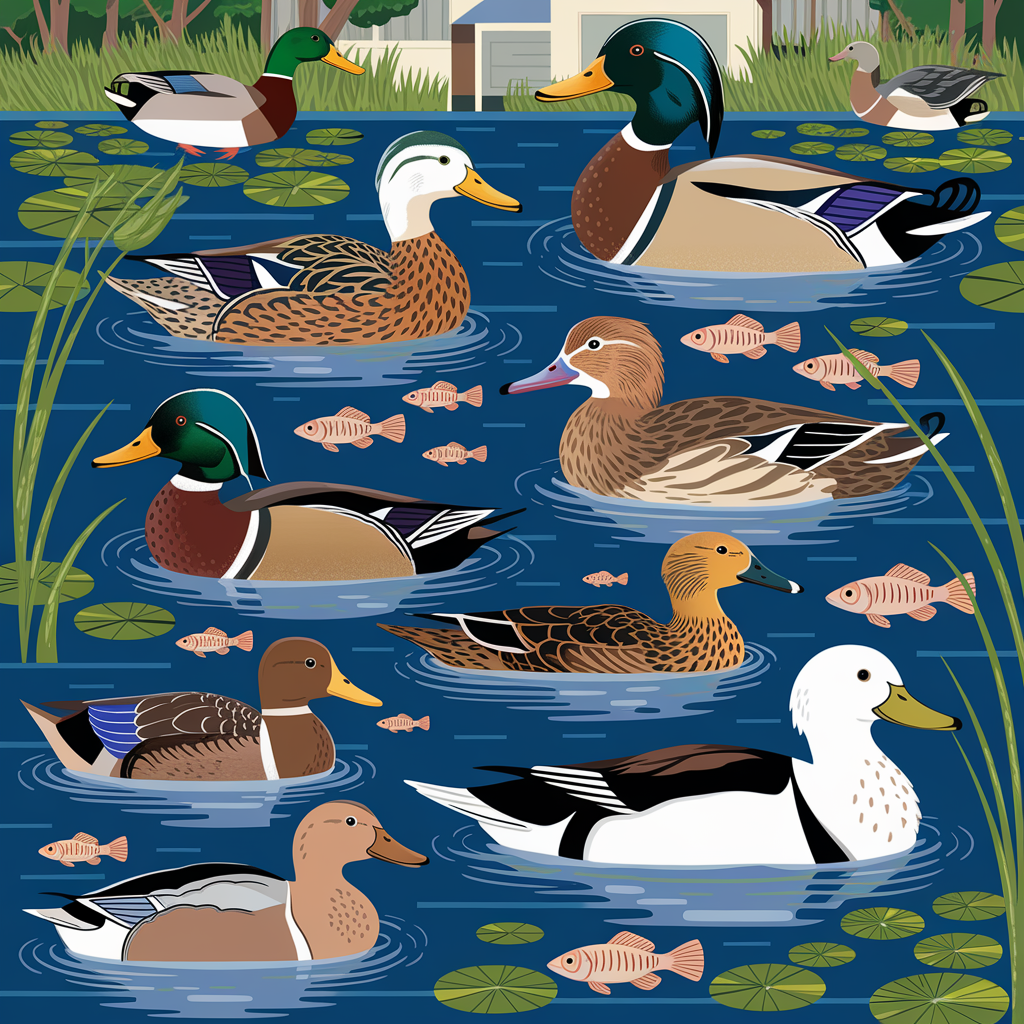Ducks are omnivores, consuming a wide variety of foods depending on availability. While fish may not be a staple for all duck species, it is undoubtedly part of the diet for many ducks, especially those that dive for food.
In this expanded guide, we will delve deeper into ducks’ fish-eating habits, explore species-specific diets, and examine the benefits and risks of fish in a duck’s diet. From understanding the behavior of fish-eating ducks to learning how to safely feed fish to domesticated ducks, we’ll cover it all.
Ducks Natural Diet and Eating Habits
Ducks are adaptive omnivores whose natural diet varies significantly based on their habitat and species. As opportunistic feeders, ducks eat what is available, including plant matter, insects, small crustaceans, and, in some cases, fish.
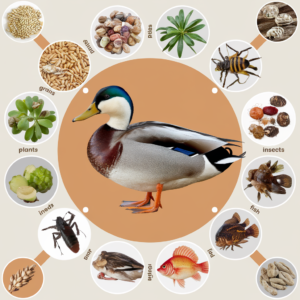
Surface Feeding vs. Diving Ducks
- Surface Feeders (Dabbling Ducks): These ducks feed mainly on vegetation, seeds, and insects, which they reach by tipping in shallow waters. Mallards, teals, and wigeons are typical dabblers. Their foraging is limited to what is floating on or near the surface. Therefore, they rarely hunt fish, though they may consume small fish by chance in shallow waters.
- Diving Ducks: Diving ducks, such as mergansers, goldeneyes, and scaups, are more adept at catching fish because they dive beneath the water’s surface. They are built for aquatic hunting, using their powerful legs and specially adapted bills to chase and capture prey underwater. Diving ducks are much more likely to include fish as a regular part of their diet than dabbling ducks.
| Duck Type | Feeding Habit | Example Species |
|---|---|---|
| Surface Feeders | Feed on vegetation, insects | Mallards, Teals |
| Diving Ducks | Dive for fish, crustaceans | Mergansers, Scaups |
Fish as Part of a Balanced Duck Diet
Fish can be a valuable food source for ducks, rich in protein, omega-3 fatty acids, and essential vitamins like vitamin D. These nutrients contribute to muscle growth, healthy feather development, and reproductive health, especially in female ducks during egg-laying seasons. Let’s break down some key benefits of including fish in a duck’s diet.
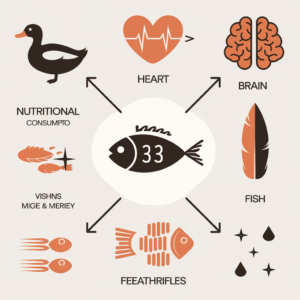
Nutritional Benefits of Fish for Ducks
- Protein: Ducks require protein for growth, muscle development, and overall health. Fish is an excellent source of lean protein that can help ducks maintain a healthy body weight and energy level.
- Omega-3 Fatty Acids: Essential for brain function and the development of healthy feathers, omega-3 fatty acids also support ducks’ immune systems and reduce inflammation.
- Calcium and Phosphorus: These minerals are vital for strong bones and eggshell production in laying ducks. Calcium, in particular, helps form hard shells that protect developing ducklings.
- Vitamins: Fish, especially oily fish like sardines, provide essential vitamins such as vitamin D, which aids in calcium absorption and promotes healthy bones.
check out this 7 Common Ducks of Alaska which provides more informations about ducks
The Role of Fish in Wild vs. Domesticated Ducks’ Diets
While fish is a natural part of the diet for many wild ducks, especially diving species, it is less common in domesticated ducks’ diets. In captivity, ducks are often fed commercial pellets, grains, and vegetables. However, incorporating fish as an occasional supplement can offer significant health benefits.
Differences in Dietary Needs
- Wild Ducks: Fish are a major food source for species like mergansers and goldeneyes. They rely on their ability to dive deep into water bodies, catching small fish like minnows and crustaceans.
- Domesticated Ducks: Domesticated ducks, such as Pekin ducks, don’t have the same need to hunt fish, but they can still benefit if introduced in moderation. A balanced diet for these ducks might include fish as a source of protein and healthy fats.
Potential Risks of Feeding Fish to Ducks
Though fish provide valuable nutrients, feeding fish to ducks involves certain risks. Understanding these risks is crucial for the health of both wild and domesticated ducks.
- Choking Hazards: Fish bones, especially those from larger species, can become a choking hazard for ducks. To avoid this risk, it is essential to feed them small, deboned fish.
- Parasites: Wild fish can carry parasites such as tapeworms or flukes, which can be transferred to ducks if the fish is not cooked correctly or treated.
- Toxicity: Fish from polluted waters may contain heavy metals like mercury or lead, harmful to ducks when ingested over time. For this reason, it is vital to ensure that the fish provided is from a safe source.
Best Fish Types for Ducks
To safely feed fish to ducks, stick to smaller, boneless fish or cook the fish thoroughly to kill off parasites. Here are a few suitable fish for ducks:
- Minnows
- Sardines (with bones removed)
- Deboned white fish (such as tilapia or cod)
These fish provide the necessary nutrients without posing significant health risks to the ducks.
How to Safely Feed Fish to Ducks
It is important to follow certain guidelines to ensure ducks can safely eat fish. Overfeeding or feeding the wrong types of fish can lead to health problems for ducks.
Guidelines for Feeding Fish to Ducks
- Cook the fish: To eliminate parasites, always cook before feeding it to domesticated ducks.
- Debone the fish: Remove all bones to avoid the risk of choking or intestinal blockages.
- Feed fish in moderation: While fish can provide beneficial nutrients, it should only be an occasional treat. Overfeeding fish can lead to obesity or nutritional imbalances in ducks.
- Vary their diet: Ducks thrive on a varied diet. In addition to fish, offer them grains, seeds, insects, and vegetables to ensure they get all the necessary nutrients.
Fish-Eating Duck Species
Some duck species are more adept at catching fish, having evolved specific physical adaptations to support this feeding behavior.
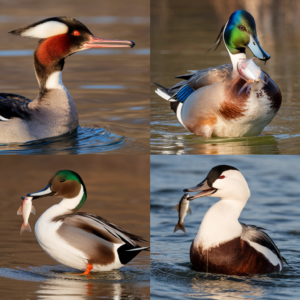
Mergansers: Masters of Fish Hunting
Mergansers are the most well-known fish-eating ducks, often called “sawbills” due to their serrated, saw-like bills. These ducks are specifically adapted to catch slippery fish in fast-flowing rivers or lakes. Their long, narrow bills allow them to secure their prey more effectively than other ducks.
- Common Merganser: Found across North America and Europe, the common merganser primarily feeds on fish, including trout, perch, and minnows.
- Hooded Merganser: With a striking fan-like crest, this species hunts in freshwater habitats and feeds on small fish, crustaceans, and aquatic insects.
Other Fish-Eating Species
While mergansers are the most proficient fish-eating ducks, several other species are known to include fish in their diets:
- Goldeneyes: This diving duck hunts for small fish, mollusks, and aquatic insects. Found in North America and Europe, goldeneyes rely on underwater prey during the winter months.
- Scaups: These ducks dive to catch fish and mollusks, especially in coastal waters.
| Species | Primary Diet | Fish Consumption |
|---|---|---|
| Mallards | Plants, Insects | Rarely eats fish |
| Mergansers | Fish, Aquatic Animals | Frequently eats fish |
| Goldeneyes | Fish, Mollusks | Often eats fish |
| Scaups | Fish, Crustaceans | Frequently eats fish |
Ducks and Fish in Ponds
Pond owners often wonder whether ducks will consume the fish in their water features. Ducks in ponds may eat small fish, but they typically prefer insects and aquatic plants. In most cases, ducks don’t significantly threaten fish populations in ponds.
Strategies for Protecting Pond Fish
If you have fish in your pond and want to prevent ducks from eating them, here are some practical strategies:
- Install Fish Hiding Spots: Use rocks, logs, or aquatic plants to create hiding spots for fish.
- Add Protective Netting: For smaller ponds, you can use mesh or netting over the water to prevent ducks from diving for fish.
- Feed Ducks Alternative Food: Providing ducks with food like grains or vegetables may reduce their inclination to hunt for fish in the pond.
Ducks are fascinating omnivores known for their versatile eating habits that vary widely depending on species, habitat, and food availability. One common question often posed is, “Do ducks eat fish?” The answer is yes, but it varies by species and environment. In this expanded guide, we will further examine the role of fish in a duck’s diet, diving deeper into how different species consume fish, the nutritional benefits, and the potential risks. We’ll also explore how you can safely feed fish to both wild and domesticated ducks, ensuring a healthy, balanced diet.
Ducks’ Diverse Diet: An In-Depth Look
Ducks are incredibly adaptive and can consume various food sources ranging from seeds and plants to insects and small fish. While not all species of ducks regularly eat fish, some are specifically equipped to hunt and consume aquatic prey.
Surface Feeders (Dabbling Ducks)
Surface feeders, dabblers, typically feed on plant matter, seeds, and insects by tipping in shallow waters. Ducks such as mallards, teals, and wigeons fall into this category. While fish may not be a primary food source for these ducks, they may consume small fish or fish fry opportunistically in shallow water environments.
Diving Ducks and Fish Consumption
Diving ducks are much more likely to include fish as a regular diet. Species like mergansers, goldeneyes, and scaups are built for diving underwater to catch prey. Mergansers, for example, have serrated bills that help them grasp slippery fish, making them highly specialized hunters in their aquatic environment.
- Critical Diving Duck Species:
- Mergansers: Known for their “sawbill” beaks, these ducks are experts at catching fish. Their diet consists primarily of small fish like minnows and crustaceans.
- Goldeneyes: Another proficient diving species, goldeneyes hunt for small fish, mollusks, and aquatic insects.
- Scaups: These ducks dive to catch fish and mollusks, especially in coastal and freshwater environments.
| Duck Type | Feeding Habit | Example Species |
|---|---|---|
| Surface Feeders | Vegetation, insects, seeds | Mallards, Teals |
| Diving Ducks | Fish, crustaceans, mollusks | Mergansers, Scaups |
Nutritional Benefits of Fish in a Duck’s Diet
Fish is an excellent source of high-quality nutrients that can benefit ducks, especially those species that rely on it as a primary food source. Here’s a closer look at the nutritional components fish provide and how they contribute to a duck’s health:
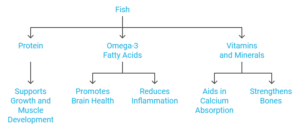
- Protein
Fish is rich in lean protein, which supports growth, muscle development, and overall energy in ducks. This protein is essential for diving species to maintain their physical strength and stamina, allowing them to dive and swim efficiently.
- Omega-3 Fatty Acids
Omega-3s are critical for brain health and feather development. These fatty acids also help maintain a robust immune system. They can reduce inflammation, which benefits ducks living in colder environments or those with strenuous diving habits.
- Vitamins and Minerals
Fish offers essential vitamins, including vitamin D, which aids in calcium absorption, and phosphorus, which contributes to strong bones and eggshell production in laying ducks.
| Nutrient | Benefit to Ducks |
|---|---|
| Protein | Supports muscle growth and energy |
| Omega-3 Fatty Acids | Promotes brain function and feather health |
| Vitamin D | Enhances calcium absorption for stronger bones |
Wild vs. Domesticated Ducks: Differences in Fish Consumption
While wild diving ducks naturally incorporate fish into their diet, domesticated ducks are less likely to have access to fish unless it is intentionally provided. Like Pekin ducks, domesticated ducks are often fed grains, commercial pellets, and vegetables. However, they can still benefit from occasional fish treats.
Key Differences:
- Wild Ducks: Species like mergansers rely heavily on fish for survival, often diving to catch small aquatic prey in lakes and rivers.
- Domesticated Ducks: Fish can be introduced to domesticated ducks in small amounts, offering valuable protein and nutrients, but should not replace their regular diet of grains and plant matter.
Risks of Feeding Fish to Ducks: What to Watch Out For
Although fish can be a healthy addition to a duck’s diet, there are certain risks to be aware of, particularly for domesticated ducks or those fed by humans.
- Choking Hazards
Fish bones, especially from larger fish species, can pose a choking risk. It’s crucial to ensure that ducks are only given small, boneless fish or fish that have been carefully deboned.
- Parasites and Contamination
Fish from polluted waters may contain harmful parasites or heavy metals like mercury. These contaminants can pose serious health risks to ducks. Cooking the fish thoroughly can help eliminate parasites, but sourcing fish from clean, safe waters is still essential.
- Nutritional Imbalance
While fish provides excellent nutrition, too much fish can cause an imbalance in a duck’s diet. It’s essential to feed fish in moderation and ensure that ducks have a varied diet that includes grains, vegetables, and other proteins.
The Best Fish for Ducks: What to Feed
Suppose you’re considering feeding fish to domesticated ducks. In that case, selecting the suitable types of fish and preparing them safely is essential. Here are some recommended fish types and preparation tips:
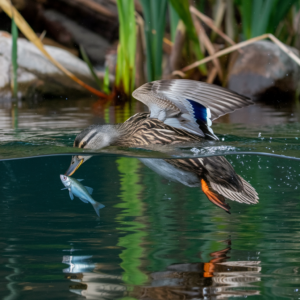
Recommended Fish for Ducks:
- Minnows: Small, easy to eat, and naturally consumed by many wild ducks.
- Sardines: A rich source of omega-3 fatty acids, but be sure to remove bones before feeding.
- Tilapia or Cod: Deboned white fish are ideal for feeding ducks as they provide lean protein without the risk of choking.
Preparation Tips:
- Always cook the fish to eliminate any potential parasites.
- Ensure that all bones are removed to avoid choking hazards.
- Feed fish as an occasional treat, not a staple in the duck’s diet.
Fish-Eating Duck Species: Diving Deeper
In addition to mergansers, several other duck species consume fish as part of their regular diet. Here are a few more examples of ducks that regularly eat fish:
Goldeneyes
Goldeneyes are found across North America and Europe. They are known for their ability to dive for fish, mollusks, and insects. During winter, fish make up a significant portion of their diet as other food sources become scarce.
Scaups
Scaups are another fish-eating species, particularly during the colder months when they dive into coastal waters and freshwater lakes to catch small fish and crustaceans.
| Species | Primary Diet | Fish Consumption |
|---|---|---|
| Mallards | Plants, insects | Rarely eats fish |
| Mergansers | Fish, aquatic animals | Frequently eats fish |
| Goldeneyes | Fish, mollusks | Often eats fish |
| Scaups | Fish, crustaceans | Frequently eats fish |
Ducks and Fish in Backyard Ponds: What Pond Owners Need to Know
If you own a backyard pond and keep ducks, you may wonder whether your ducks will harm the fish population. The answer largely depends on the fish’s size and the duck species. Ducks usually won’t significantly impact a healthy fish population in a well-maintained pond.
Protecting Fish in Ponds:
- Hiding Spots: Add rocks, aquatic plants, or other hiding spots for fish to protect them from ducks.
- Netting: Use mesh netting over smaller ponds to prevent ducks from diving.
- Alternative Foods: Providing ducks with grains or vegetables can deter them from hunting fish.
Frequently Asked Questions (FAQs)
Do all ducks eat fish?
No, not all ducks eat fish. While some diving ducks like mergansers and goldeneyes regularly consume fish, surface-feeding ducks like mallards mostly eat vegetation, seeds, and insects.
Is fish safe for domesticated ducks?
Fish can be a healthy addition to a domesticated duck’s diet if fed in moderation. Be sure to remove bones and cook the fish to eliminate parasites.
Can fish be harmful to ducks?
Fish from polluted waters or fish with bones can pose risks to ducks. It’s essential to ensure that the fish is free of contaminants and adequately prepared.
Do ducks in backyard ponds eat fish?
Ducks in backyard ponds may eat small fish, but they typically prefer insects and aquatic plants. Most pond fish are not at risk from ducks as long as they have hiding spots.
Conclusion
Ducks, particularly diving species, can and do eat fish as part of their natural diet. While not all ducks consume fish regularly, many benefit from the high protein and omega-3 content that fish provides. Whether you’re feeding domesticated ducks or observing wild ducks, understanding the benefits and risks of fish consumption is critical to ensuring their health.
If you’re a pond owner or interested in feeding your ducks fish, always prioritize safe feeding practices. Providing a well-rounded diet and understanding the habits of different duck species will contribute to healthier, happier ducks in any environment.
Read Also This: Can Birds Eat Bread?

